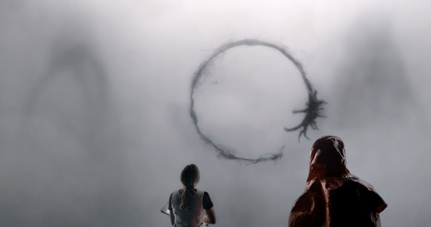For much of its runtime, Arrival depicts a technical process, and Villeneuve crafts a technically extraordinary film to match. He's worked with some of the best cinematographers in the business, particularly Roger Deakins, but the director's collaboration here with Bradford Young likely tops it. The look of Arrival is flawless, aided by the sleek design of the heptapod ships. Reflective and onyx-black with an elegant ovoid shape, the one that Banks works with sits nestled in a mountain valley, first revealed amongst rolling fog in a breathtaking shot. Ascending the craft is a mind-bender, as it creates its own gravity past a center point, and Young finds a seamless way to integrate a change in orientation. Aurally, Johann Johannson's electronic score is a stark relief against Max Richter's plaintive On the Nature of Daylight piece, used at the beginning and end of the film to great effect, almost single-handedly bringing the pathos that the film otherwise isn't quite able to get across.
To go with the look and sound of the film is a story that understands the power of discovery. Banks gets several Eureka moments, and Adams, reliably excellent, communicates both the joy of winning that one intellectual battle and the restraint of knowing that the war continues. Eric Heisserer's script, adapted from a book by Ted Chiang, is able to keep the revelations from being drowned in opaque techno-babble while still allowing Banks to be brilliant by slotting in Forrest Whittaker's Colonel Weber as an audience surrogate for her to explain things to. Admittedly, this is a device that gets a little old, as he keeps presenting her with skepticism and a reluctance to go forward, and then she tells him why he's wrong, and he gives her permission to go back up into the ship, but it's a passable, utilitarian solution in search of a more cinematic one.
What she's explaining is the best part of the film, as if the viewer is suddenly a fly on the wall to the first meeting between Europeans and Native Americans. Arrival is utterly preoccupied with communication, such that whatever Donnelly is teaching to/learning from the hectapods is unclear. They communicate with intricate circles and patterns, with each idea sent from one of their tendrils as a puff of smoke that curls into a loop with specific blotches and branches coming off it. Seeing Banks decipher all this is thrilling, as are the next dilemmas that come from whether or not she's interpreting correctly. Much of the global drama comes from whether a loop segment means either 'weapon' or 'tool,' with some nations coming to different conclusions than others. These kinds of tiny misunderstandings, also addressed in Martin Scorsese's Silence, reverberate throughout history, and Arrival prompts the viewer to think about how easily such a mistake can be made.
Where the film starts to break down is in its reaching for deeper meaning. Like Interstellar before it, the film overcompensates and leans into a more maudlin interpretation, perhaps to offset the more clinical aspects. There's nothing as bad as Anne Hathaway's dreadful 'love is the most powerful force in the universe' speech from Christopher Nolan's space epic, but in attempting to close its loop, Arrival goes for an ambitious ending that feels like a bit too much. It has a timely, globalist optimism on a planet-wide scale, which is typical of space-related films, but it also has a time-bending aspect that seems to conflict with the internal logic of the film. This is a film where I ultimately found myself shocked for not feeling stronger about it, and much of that is likely tied up in the head-scratcher of a final act. A second-viewing might make the film land harder, and when Arrival is such an impressive undertaking in so many other ways, revisiting it is an easy proposition. B

 RSS Feed
RSS Feed